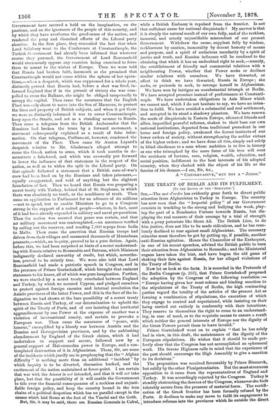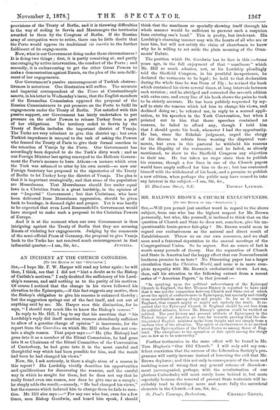THE TREATY OF BERLIN AND ITS FULFILMENT.
[TO THE EDITOR OF THE "SPECTATOR."]
SIR,—The mot d'ordre has evidently gone forth to divert public attention from Afghanistan to Turkey in Europe. The country has now seen that the "Imperial policy" of our Government consists in truckling to the strong and bullying the weak, play- ing the part of a Bombastes Furioso towards Russia, but dis- playing the real measure of their courage by a trial of strength with a puny potentate like Shere Ali. The British Lion, to do him justice, does not like to be made ridiculous, and he has reso- lutely declined to roar against small Afghanistan. The necessary stimulus must therefore be got by getting up, if possible, another anti-Russian agitation. Hence the Chancellor of the Exchequer, in one of his recent speeches, advised the British public to turn their attention from Afghanistan to Roumelia ; and the Ministerial organs have taken the hint, and have begun the old game of shaking their fists against Russia, for her alleged violations of the Treaty of Berlin.
Now let us look at the facts. It is recorded in the Protocols of the Berlin Congress (p. 253), that Prince Gortchakoff proposed the adoption by the Congress of the following resolution :— " Europe having given her most solemn and binding sanction to the stipulations of the Treaty of Berlin, the high contracting parties regard the totality of the articles of the present Act as forming a combination of stipulations, the execution of which they engage to control and superintend, while insisting on their being carried out entirely in conformity with their intentions. They reserve to themselves the right to come to an understand- ing, in case of need, as to the requisite means to ensure a result which neither the general interests of Europe nor the dignity of the Great Powers permit them to leave invalid."
Prince Gortchakoff went on to explain "that he has solely had in view, in this draft, the maintenance of the dignity of the European stipulations. He wishes that it should be made per- fectly clear that the Congress has not accomplished an ephemeral work. His Serene Highness calls to mind that the experience of the past should encourage the High Assembly to give a sanction to its decisions."
The proposition was received favourably by Prince Bismarck, but coldly by the other Plenipotentiaries. But the most strenuous opposition to it came from the representatives of England and Turkey. It was accordingly rejected by the Congress. Turkey is steadily obstructing the decrees of the Congress, whenever she feels tolerably secure from the pressure of material force. The rectifi- cation of the Greek frontier has been formally refused by the Porte. It declines to make any move to fulfil its engagement to introduce reforms into the provinces which lie outside the direct
provisions of the Treaty of Berlin, and it is throwing difficulties in the way of ceding to Servia and Montenegro the territories awarded to them by the Congress of Berlin. If the Russian army of occupation were to retire, there can be little doubt that the Porte would oppose its traditional via inertim to the further fulfilment of its engagements.
Now, what is our Government doing under these circumstances ? It is doing two things ; first, it is partly conniving at, and partly oncouraging by active intervention, the conduct of the Porte ; and secondly, it is endeavouring to get the other Great Powers to make a demonstration against Russia, on the plea of the non-fulfil- ment of her engagements.
Our Government's passive encouragement of Turkish obstruc- tiveness is notorious. One illustration will suffice. The accurate and impartial correspondent of the Times at Constantinople asserts, in his letter in Wednesday's issue, that the English members of the Rournelian Commission opposed the proposal of the Russian Commissioners to put pressure on the Porte to fulfil its -engagements under the Treaty of Berlin. Not satisfied with this passive support, our Government has lately undertaken to put pressure on the other Powers to release Turkey from a part of her obligations. The territory ceded to Servia by the Treaty of Berlin includes the important district of Vranja. The Turks are very reluctant to give this district up ; but even Turkish impudence is unequal to the task of asking the Powers who framed the Treaty of Paris to give their formal sanction to the retention of Vranja by the Porte. Our Government has accordingly been deputed to do the Turk's dirty work ; and as our Foreign Minister last spring conveyed to the Hellenic Govern- ment the Porte's menace to burn Athens—a menace which even the Turk was ashamed to utter by his own mouth—so now our Foreign Secretary has proposed to the signatories of the Treaty of Berlin to let Turkey keep the district of Vranja. The plea is that it is important strategically, and that some of the population are Mussulmans. That Mussulmans should live under equal laws in a Christian State is a great hardship, in the opinion of our "Imperial" Government ; but that Christians, who have been delivered from Mussulman oppression, should be given back to bondage, is deemed right and proper. Yet it was hardly to be expected that even Lord Beaconsfield's Government would have stooped to make such a proposal to the Christian Powers cd Europe.
And it is at the moment when our own Government is thus intriguing against the Treaty of Berlin that they are accusing Russia of violating her engagements. Judging by the comments of the semi-official Press of Germany, the proposal to give Vranja back to the Turks has not received much encouragement in that
influential quarter.—I am, Sir, &c., JUSTITIA.



































 Previous page
Previous page